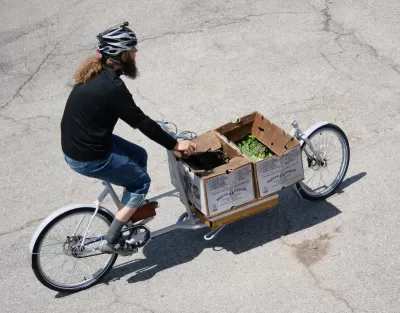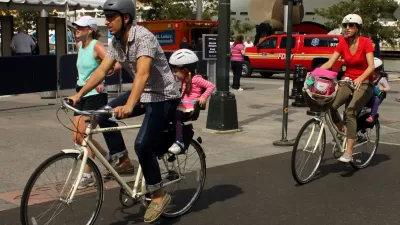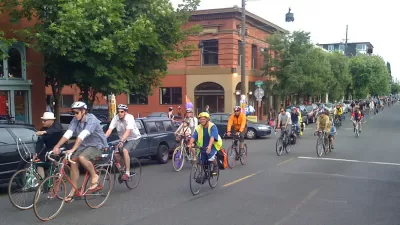Familiar with the perception that bicyclists are generally kids with no money and too much time? Emily Badger discusses the findings of a study that shows riders out-consume drivers over the course of a month for all businesses except grocery stores.

In the bike-friendly city of Portland, the government plans to encourage new riders by extending bicycle infrastructure to neighborhoods farther from the urban center. The problem, says Kelly Clifton, is "[a]s we move out beyond those areas into more auto-oriented areas, we start to see businesses say, 'Hey, wait a minute. You're taking away on-street parking to put in bike lanes, you're taking away the one parking spot in front of my store to put in a bike corral. I don't see many bikers around here. So what does this mean for me?"
For most business owners, drivers make up the majority of all customers. However, a study [pdf] conducted for the Oregon Transportation Research and Education Consortium finds that drivers visit establishments less frequently than cyclists and pedestrians, who make frequent trips and end up spending more over a month. "This finding is logical," says Badger, "It's a lot easier to make an impulse pizza stop if you're passing by an aromatic restaurant on foot or bike instead of in a passing car at 35 miles an hour." This behavior doesn't apply to grocery stores where drivers with their greater trunk capacity outspend other travelers.
For the study, Clifton and colleagues surveyed 1,883 people walking out of convenience stores, restaurants and bars; and another 19,654 out of supermarkets. "There are obviously some other factors at play here," admits Badger. "Families with cars are less likely to eat out than single young professionals on a bike. And we'd all prefer that drivers run up smaller bar tabs than pedestrians." Clifton raises the possibility of the "green dividend," which means that Portland's green infrastructure allows people to save on transportation and direct their money towards other expenses.
FULL STORY: Cyclists and Pedestrians Can End Up Spending More Each Month Than Drivers

Alabama: Trump Terminates Settlements for Black Communities Harmed By Raw Sewage
Trump deemed the landmark civil rights agreement “illegal DEI and environmental justice policy.”

Study: Maui’s Plan to Convert Vacation Rentals to Long-Term Housing Could Cause Nearly $1 Billion Economic Loss
The plan would reduce visitor accommodation by 25% resulting in 1,900 jobs lost.

Planetizen Federal Action Tracker
A weekly monitor of how Trump’s orders and actions are impacting planners and planning in America.

Wind Energy on the Rise Despite Federal Policy Reversal
The Trump administration is revoking federal support for renewable energy, but demand for new projects continues unabated.

Passengers Flock to Caltrain After Electrification
The new electric trains are running faster and more reliably, leading to strong ridership growth on the Bay Area rail system.

Texas Churches Rally Behind ‘Yes in God’s Back Yard’ Legislation
Religious leaders want the state to reduce zoning regulations to streamline leasing church-owned land to housing developers.
Urban Design for Planners 1: Software Tools
This six-course series explores essential urban design concepts using open source software and equips planners with the tools they need to participate fully in the urban design process.
Planning for Universal Design
Learn the tools for implementing Universal Design in planning regulations.
Caltrans
Smith Gee Studio
Institute for Housing and Urban Development Studies (IHS)
City of Grandview
Harvard GSD Executive Education
Toledo-Lucas County Plan Commissions
Salt Lake City
NYU Wagner Graduate School of Public Service




























